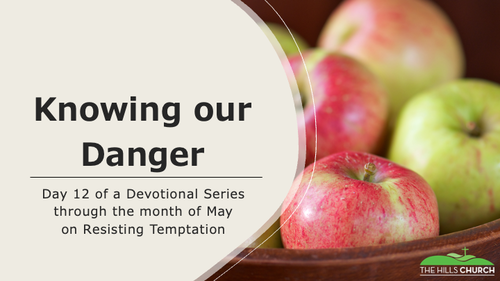Day 12 - Knowing Our Danger
When [some people] are overtaken with a sin,
they set themselves to repent of that sin,
but they do not consider the temptation that was the cause of it.
They are displeased with the bitter fruit, but cherish the poisonous root.
John Owen, Temptation Resisted and Repulsed

How do we know when we have entered into temptation?
That is the question for today: How do we know when we have entered into temptation? If we are trying not only to avoid temptation, but to resist it when we've entered into it, how do we know we are in the throes of temptation? How do we know when we've crossed over that line of just being tempted, of just facing a temptation, to when we have entered into the temptation, when we are truly entertaining it?
Five indicators we have entered into temptation
Owen describes five (5) ways, or indicators, that we have entered into temptation.
1) When we are drawn into any sin, we have entered into temptation.
2) When a temptation is so powerful, so "violent" that we know and feel it, we have entered into temptation.
3) When are heart slowly and secretly enjoy the temptation and what we are being tempted with, we have entered into temptation.
4) When we give any opportunity (by the condition we are in or our circumstances) for our lusts to be stirred up, we have entered into temptation.
5) When we are weak, careless, or negligent in carrying out our duties in following Christ or we take no joy or satisfaction in doing them, we have entered into temptation.
1) When we are drawn into any sin, we have entered into temptation.
This may seem a point on the obvious, but the emphasis here is that "all sin is the result of temptation (Jam 1:14)." That is, if you are drawn to sin (you want to commit the sin though you have not committed it yet), then you have entered into temptation.
2) When a temptation is so powerful, so "violent" that we know and feel it, we have entered into temptation.
There are some temptations that we can feel at our very core. They draws us so strongly, that we know the temptation has joined with our lusts in such a way that we have entered into temptation, we have entered into that time when we are truly entertaining and longing for the sin.
3) When are heart slowly and secretly enjoy the temptation and what we are being tempted with, we have entered into temptation.
Unlike #2, where a temptation is so strong it immediately overwhelms us, these temptations are the ones that simmer and gradually overtake us because we just won't resist it, we won't step away from it. Temptations such as pride of intelligence or discipline may on the surface seem positive to us, but they draw us into self-exaltation and bragging about our own accomplishments. These are the long-running temptations (and sins) that beset us for a lifetime.
4) When we give any opportunity (by the condition we are in or our circumstances) for our lusts to be stirred up, we have entered into temptation.
If we are putting ourselves into a position to be tempted, then we are not just tempting ourselves with temptation, we have already entered into it. We have effectively already chosen to enter into the temptation.
5) When we are weak, careless, or negligent in carrying out our duties in following Christ or we take no joy or satisfaction in doing them, we have entered into temptation.
Neglecting our call to walk with Christ in prayer, meditation, Bible study, gathering together, etc. is entering into temptation. These may seem benign, harmless, to us because we may not see their immediate impact to our lives, but such neglect or joyless obedience is the path way of temptation into sin. It is just a matter of time. Take note that this is not just about doing things but also how we do things. We must both carry out our Christian duties and we must do it with joy!
Our Challenge
To see temptations for what they are, Owen points us to not just be "displeased with the bitter fruit [of sin];" rather, we must not "cherish to the poison root [of temptation]." We must "lie in the dust with a sense of our own vileness." That is, we must recognize the depth of our own sin to understand how easy it is for us to enter into temptation. And we must also pray that we will not merely find sorrow when we see our own sinfulness, but we will experience joy when we see what Christ has done for us and in us so that we might live to Him and resist temptation.
